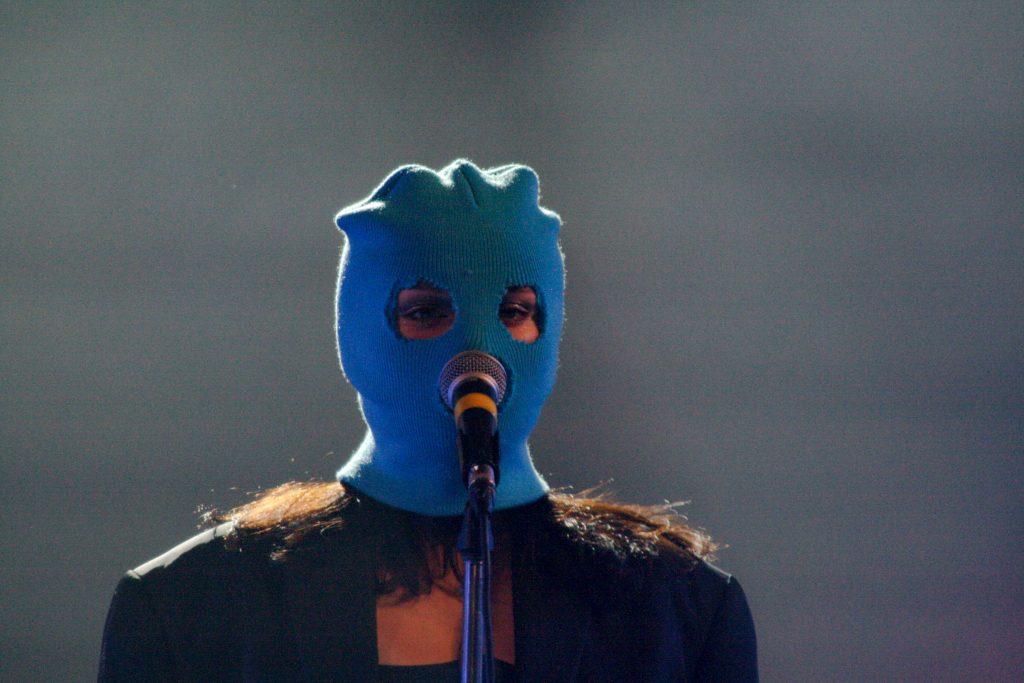By: Eva Lynch
The best show I saw this year was never meant to be a concert. Nor was it technically a band. Yet despite their adamant refusal to be categorized as such, it seems that while Pussy Riot didn’t intend to become a musical group, punk has chosen them and made them its own. Their November show in Montreal was one of the most moving and mind-bending performances I have seen in a while and left an impression which will last for years to come.
To start the show, the producer and video director of the visual elements for Riot Days Alexander Cheparukhin, came on stage to introduce the band and provide some context for the show which was about to unfold. “Pussy Riot was never a punk band,” he said to the crowd, “they were never a band at all.” While they have released music over the past few years, Cheparukhin articulated how the music has always been a tool to keep people engaged.
When they realized that people thought Pussy Riot was a band and would ask if they were going to tour, they figured why not take advantage of the misconception and create a new type of performance; and thus ‘Riot Days’ was born. Turning their work into spoken word and adding in instrumentalists like Composer Alina Petrova with her electric violin and Moscow-based drummer, producer and sound artist Diana Burkot, alongside other pussy riot member Olga Borisova, the show tells the story of Maria “Masha” Vladimirovna Alyokhina and her ‘Riot Days,’ as she calls them in her book, which chronicles her journey as a feminist political activist and focuses on the two years she spent in a gulag prison after Pussy Riot’s infamous “punk-prayer” action and guerrilla-style musical performance in 2012 at Moscow’s Cathedral of Christ the Saviour Church. Five members of Pussy riot, including Masha entered the church disguised in large winter coats, before they pulled on the group’s trademark balaclavas and performed a song which prayed to the Virgin Mary to help get rid of Putin, in protest of the then-recent election widely believed to be rigged, whose lyrics highlighted the relationship between the church and Russian intelligence services like the KGB, and criticized the anti-feminist traditions of the church. The performing members were arrested on charges of ‘hooliganism’ and sent to separate labour camps hundreds of miles apart. The harsh sentence attracted international criticism, where Amnesty
International called the women “prisoners of conscience.”
The performance is a non stop flow of what feels like Russian spoken word overlaid onto electronic and experimental rhythmic beats, telling this story and situating us to what Russia felt like at this time with the blending of archival and performance videos on screen behind the four performers with English translations or subtitles to their live performances running along the screen behind them. However, even without the translation and across the language barrier, you can feel the emotion and rage pour
through the music as it entrances everyone in the room.
Alternating between more somber tracks and highly-energetic chapters which has them donning their classic neon balaclavas or has Olga pouring bottle after bottle of water onto the awaiting crowd, the show manages to capture the spirit of the protest feminist collective. Sharing not only their own experiences but what has mobilized and motivated them, from political events and injustices to their family, Masha speaks particularly about how her son was two when she was imprisoned and what it meant to lose out on that period of his life. It was brash and heavy while being equally sincere and enraged, which created one of the most moving and powerful shows I’ve ever seen, where for one night it feels like we all become a part of Pussy Riot. We return to our independent lives changed and more aware of the world around us.
As the show concludes they take a moment to share their immense gratitude and bring up an advocate for a volunteer letter writing campaign to political prisoners in Russia right now, called Voices of Resistance, and Masha mentions how much it meant to receive letters from abroad and feel that support and connection when she was imprisoned. After an electric show like that, it would be easy to bask in the moment of finishing it, and the ongoing applause which is bouncing off the old walls of the Rialto, however they chose to take that moment in the spotlight and once more center other voices and causes, highlighting their dedication to highlighting anti-war efforts and emphasizing how these shows are seen as a political tool for outreach and connecting to communities beyond the story or performance themselves. The profits from their merchandise and from most of the show are being directed to a children’s hospital in Ukraine as the band remains outspoken in their dissent of Putin and have continued to courageously shine a light on the brutal injustices the Russian state has inflicted on its citizens through the means of political imprisonment, arbitrary arrests, extrajudicial executions, mysterious poisonings, aggressive surveillance, and other ways of suppressing critical voices.
If you want to experience any taste of this energy, you can still catch Pussy Riot’s Exhibition Velvet Terrorism: Pussy Riot’s Russia, until March 10th at the MAC, which is a curation of their performances, music, and videos.
